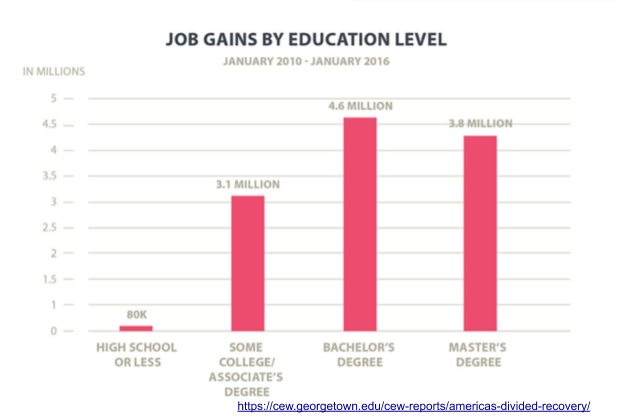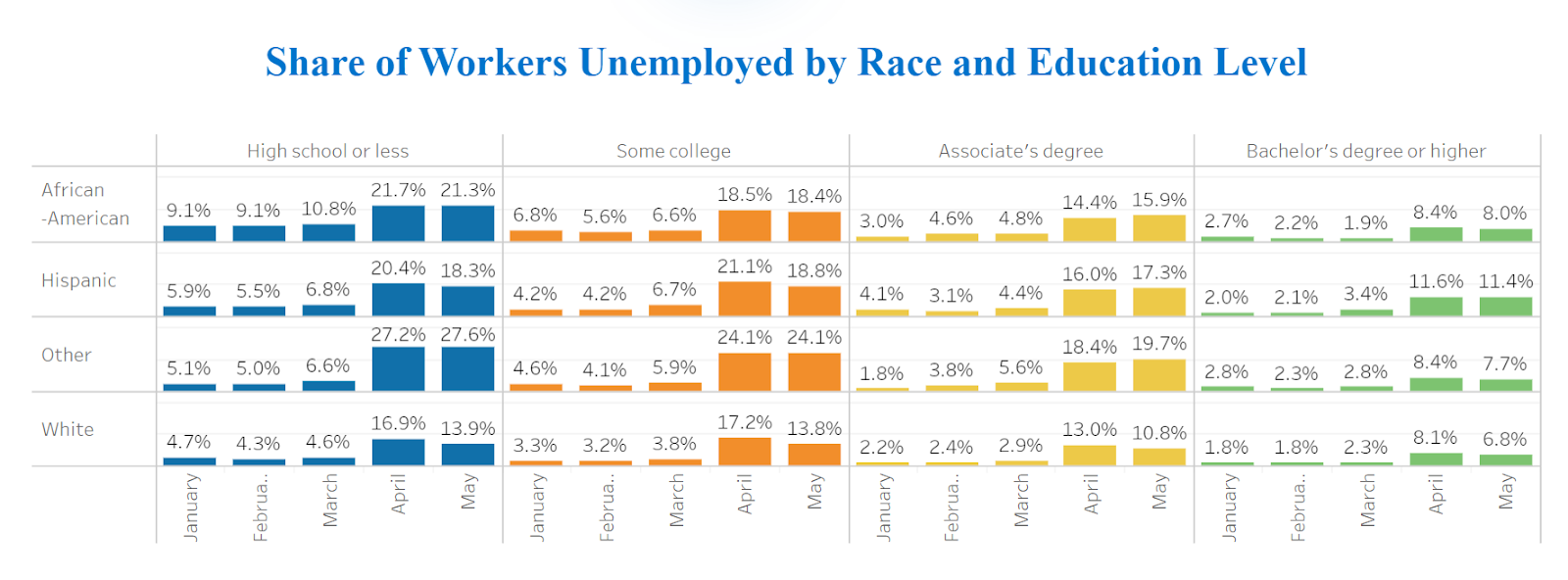The Future of Education: Is college still worth it?
The impact of COVID-19 on job markets and the worsening student debt crisis has raised a popular question: is going to college worth it? The student loan debt, now at a record $1.6 trillion, is in a similar situation as the housing crisis in 2008 when people’s financial situation went upside-down. An upside-down loan situation is when the item you buy loses value faster than the loan balance decreases. Our system of education, which in some cases keeps students in college till the age of 30, has created a situation where the value of college degrees is depreciating drastically in comparison to the appreciating student debt.
The intention of this article is to analyze the positive and negative outcomes of the current system to suggest enhancements that would benefit students by preparing them for the future, without leaving a considerable burden of debt on them.
Positive Impact of a College Education
The experience of going to college is deeply valuable to students as it gives them a place to discover who they are. The platforms institutions provide to students to build peer groups and engage in a wide variety of discussions leaves a lasting positive impact on students. It also puts students in a place where they discover new ideas in diverse settings and challenge their implicit biases to discover what they stand for and believe in. The facilities and opportunities provided by institutions also make the experience enriching. It helps students think critically and form an intellectual rigor, which is required to study and comprehend difficult texts and concepts, that benefits them when they enter the job market.
Statistically, bachelor's degree holders are expected to earn $1248 weekly, in comparison to $746 for high school graduates. The distribution of employment opportunities during the phase of recovery also favored students who had attained college education.
The pandemic also proved the importance of a bachelor’s degree. According to research done by the Center on Education and Workforce at Georgetown University, the share of workers unemployed was considerably higher for workers without a bachelor’s degree. It also highlighted the importance of degrees for minority communities, identifiable in the share of unemployed workers below:
For more benefits of education, check out this resource put together by Northeastern University
Negative Impact of College Education
While the benefits of a degree are undoubtedly important, it is important to look at the situation critically. The distribution of access to resources in early stages has a heavy impact on the educational situation of high school graduates. This report by Brookings highlights the role played by race and income in determining the success of students at college. To have a fair system, it is important to address issues of access and distribution of opportunities in a procedure that justly evaluates applicants.
The most apparent negative outcome of the current system is undoubtedly the student debt crisis. A disparity in the quality and outcomes of education encourages students to take large loans in order to attend institutions without holistically analyzing the risks attached to them. At $1.6 trillion dollars, addressing the student debt crisis should be a priority for institutions and governments.
The system is also structured in a punitive way that develops a strong sense of competition between students rather than being positive and helpful. The deteriorating mental health of students is also a cause of concern that is often unaddressed by institutions.
The system also tries to project a diverse setting, but this is often superficial. While there is an attempt to have some sort of diversity in the student body, staff and faculty are predominantly white. There are also important critiques of the lack of diverse voices in the curriculum that project an exclusive racial dominance in academia and intellectual discourse.
Another criticism attached to the current system is the prevalence of the “weed out approach” of not trying to learn about a subject unless you’re planning to have a career in this field. This is in stark contrast to the projection of universities as spaces where students get the opportunity to try new things and discover what they like. A similar negative outcome is the overdependence of the system on imparting theoretical knowledge and ignoring its experiential aspect.
Enhancements
The most urgent issue to address is the rising student debt crisis. Apart from a governmental approach, the crisis can also be addressed by institutions by integrating peace finance approaches into the affordability section and offering ethical student loans that are designed to benefit students. An example is the Tuition and Income Share Agreement (ISA) offered by Lamada School where, “ISA is a contract under which you agree to pay 17% of your post-Lambda School salary for 24 months, but only once you're making more than $50,000 per year (or the equivalent of $4,166.66 per month). The ISA is capped at a maximum repayment of $30,000, so you won’t pay more than $30,000 under any circumstances.” Another opportunity for institutions to make college more affordable is by embracing the blended learning approach, which a number of universities have adopted post pandemic as a safety measure, for its pedagogical and financial benefits.
There is a call for making more safe spaces within universities and providing access to mental health services. There is a LendEdu guide available that helps students locate specific scholarships available to them that can help reduce their financial stresses of affording higher education. This guide also provides information for students regarding specific mental health accommodations available on college campuses. The system also needs to refocus from examinations to projects and experiential learning, in order to engage students more effectively. Another addition that enhances education is offering self-learning paths to students that encourage non-curricular research and lifelong learning. The institutions must also focus on helping their students gain consequential and essential soft-skills and life skills. A vital suggestion is the incorporation of financial literacy that prepares students for taking consequential decisions in the future. There also needs to be a reexamination of the existing framework of “diversity” on campus that can be categorized as superficial. In order to create a truly diverse space, institutions must focus on incorporating diverse viewpoints, across various difference boundaries and group identities, in their curriculum and having representation not just in the student body but also staff and faculty. The curriculum should evolve with evolving times and the students must be presented with opportunities to engage with it. The system also needs to turn student-centric by engaging more efficiently with the student body and implementing their suggestions.
Conclusion
While having a degree is beneficial, educational systems need to be reformed. Institutions must focus on discovering ways in which concepts learned in classrooms can be applied to real life situations that have a positive impact in society. They should also explore methods of instruction that encourage thinking and understanding, rather than hearing and believing. The overall goal of education must be the holistic development of students and equitable distribution of knowledge resources that will be definitive in the future.
For more on COVID-19’s impact on existing systems, sign up for our newsletter here


